STEM careers are projected to grow 8% by 2029, compared to 3.7% in other careers. Unfortunately, high-needs schools often lack the up-to-date, hands-on equipment and technology required to help students engage in STEM lessons and prepare them for future careers.
The PPG Foundation, the philanthropic arm of PPG, a leading paint and coating manufacturer, is continuing their commitment to supporting the next generation of STEM professionals by partnering with AdoptAClassroom.org® for the third consecutive year. To advance equity in STEM, they provided grants to 10 high-needs middle and high schools in communities where they operate, this year targeting Cleveland, OH; East Point, GA; Huntsville, AL; Greensboro, NC; and Oak Creek, WI.
Teachers spend an average of $860 a year purchasing the school supplies their students need, and nearly half of teachers said their classrooms need technology for this year.
The PPG Foundation’s support ensured nearly 4,500 students received access to engaging STEM materials this school year, without teachers having to spend their own money. The difference they made in STEM classrooms will support even more teachers and students for years to come.
In honor of Teacher Appreciation Week, we are proud to share some of the transformational results from the PPG Foundation’s donation.
Engaging Students With Robotics at Melvin C Swann Jr. Middle School in Greensboro, NC
Before receiving a donation from the PPG Foundation, Melvin C Swann Jr. Middle School students lacked essential learning materials and engagement with STEM lessons was low. With PPG’s support, the school can now provide students access to hands-on STEM learning tools such as robotics kits, science kits, STEM equipment like an engraver and vinyl cutter, and other technology resources.
According to Quincy, the school’s computer science discoveries teacher, student engagement with and interest in STEM subjects increased drastically once they received up-to-date STEM equipment for the modern age.
“One anecdote that stands out is when we introduced the coding robotic kits to our students,” said Quincy. “Initially, many of them were hesitant and unsure about coding and robotics. However, as they began working with the kits and seeing their creations come to life, their enthusiasm grew exponentially. Students became deeply engrossed in designing and programming their robots, collaborating with peers, and troubleshooting challenges. Witnessing their excitement and sense of accomplishment was truly rewarding.”
By funding high-needs schools’ STEM programs, PPG is helping educators ensure students in low-income communities are ready for 21st-century jobs and aren’t left behind after graduation.
“This grant ensured all students had the necessary supplies, equipment, and opportunities to succeed in STEM fields,” said Quincy.
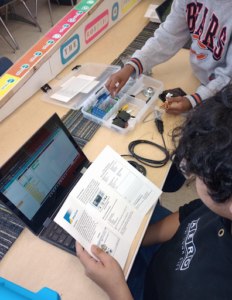
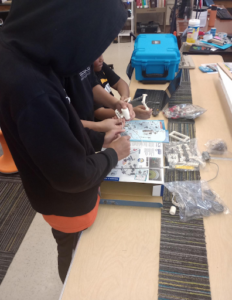
Building Innovation Stations at Whitesburg Middle School in Huntsville, AL
Whitesburg Middle School’s objective was to use the generous donation from the PPG Foundation to get students interested in future STEM careers, particularly engineering. They created a STEM makerspace classroom so they could provide an equitable way for current and future students at Whitesburg Middle to access STEM resources.
“This project has the potential to impact 1000s of students from low-income housing,” said Nancy, middle school teacher at Whitesburg Middle. “This is very beneficial to our STEM department because Whitesburg Middle is a Title I school.”
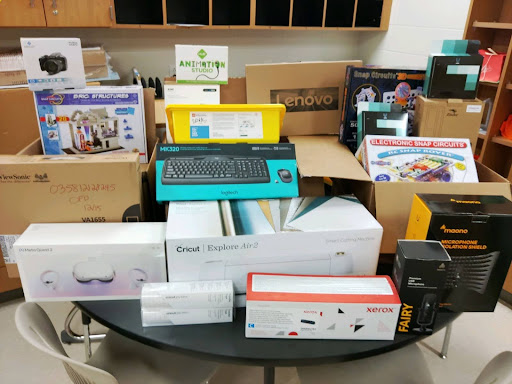
In the makerspace classroom, students get a STEM Makerspace Day to choose an “innovation station” to collaborate to design and create their own STEM projects.
According to Nancy, her students were highly engaged with STEM Makerspace Day, and their response was “Can we do this every day? When will I get to do this again? Will we have a classroom like this in high school?” Nancy is now planning the next STEM Makerspace Day to get students back to their innovation stations.
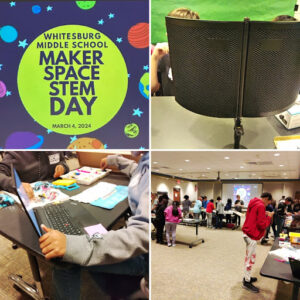
Creating Curiosity for Science at Paul D West Middle School in East Point, GA
Paul D West Middle School used their grant funding to create an interactive space in the library to teach STEM lessons like science, 3D modeling, coding, and robotics projects. Mytee, media specialist at Paul D West Middle School, sees the integration of STEM in the library’s media center as a way to “enhance traditional library services” to engage students.
“The students were absolutely amazed that they had the ability to build their own robots using coding basics. They had felt like both things were not something within reach, and with our lessons, they grew more confident and empowered,” said Mytee. “I really enjoyed seeing all our students completely engaged. Even students that are often reluctant participants were problem-solving and working with their team.”
By reimagining how a library can support students in the 21st century, Mytee’s vision is getting students interested and engaged in the library and STEM. However, Paul D West Middle School couldn’t have purchased all of the equipment needed for the up-to-date media center without the PPG Foundation.
“Having the PPG Foundation’s support of our school meant so much because it helped kick start our program. We would not have had the amazing engagement in our lessons had it not been for their support,” said Mytee.
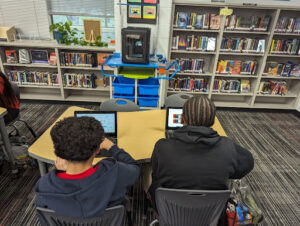
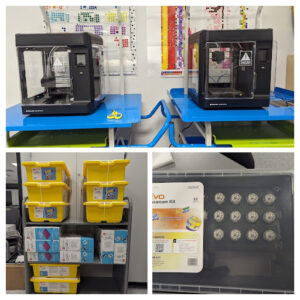
Building Bridges at MC2STEM High School in Cleveland, OH
The North Coast Connector is a proposed land bridge project to help unlock the potential of downtown Cleveland, OH. Residents are invited to voice their ideas for the development project, so MC2STEM High School is using their funding from the PPG Foundation to turn this into a STEM project for their students.
This isn’t only a project students can turn in to their teachers for a grade. Paul, the head of school at MC2STEM High School, is implementing this design project into the curriculum so that students can engage in a real STEM assignment they can submit to the city to potentially influence change in their community.
“The PPG Foundation’s support of MC2STEM allowed students to participate in a real-world design challenge that will directly and drastically impact their community for the coming decade,” said Paul. “As a direct result of these funds students were able to design real prototypes that will be used, refined and implemented during the next semester.”
Learning About Environmental Impact at South Milwaukee Middle School in Oak Creek, WI
Chris, work-based learning coordinator at South Milwaukee Middle School, noticed that the 7th graders needed STEM tools to help them learn about the environment and how humans impact it.
“Before receiving the PPG Foundations’ grant the 7th graders didn’t focus on their environment around them as much. They learned about electricity, but didn’t have a way to collect physical data and explore the impact we have on the world right outside our school doors.”
Using his school’s grant from the PPG Foundation, Chris purchased sensors that allowed students to look at urban heat maps and learn how parking lots affect the environment. Providing environmental STEM tools helped students learn and ensured their teachers had the materials they needed to teach.
“Getting this grant has given me the ability to provide numerous hands-on and relevant experiences for all my students. Our school is near Lake Michigan and Oak Creek, and has prairie and marshland areas. The 7th graders will be using their PocketLab sensors to conduct heat maps of developed areas (like parking lots and our new astro-turf field) and undeveloped areas (like by the creek, in a wooded area) to discover what the impact of human intervention may be. These sensors give them the ability to explore the outdoors right outside their classrooms and to see that all these ‘environmental impacts’ we talk about in class are happening right outside the school.”
Learn more about PPG’s global investment in STEM education.
